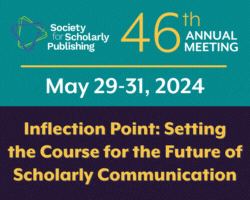The second half of our 2019 webinar series begins with an expert panel that will discuss moving beyond pro/con arguments surrounding Plan S and highlight multiple new opportunities developing across the industry. Our September webinar, Plan S: Opportunities for the Future of Scholarly Publishing, on Tuesday, September 17, 2019, from 11 am – 12 noon Eastern Time. Registration for the event remains open with a discount available for SSP members. Click here to register now.
Several constructive discussions at SSP’s 2019 Annual Meeting regarding Plan S in particular and Open Access, in general, suggest that Plan S is the next tipping point in scholarly communications, catalyzing to drive real change over the next decade. It may not result in the exact landscape sought by any single protagonist—authors, researchers, funders, societies, publishers, libraries, the public—but more will be achieved by these players working in concert than in conflict.
In this webinar, the panel seeks to present a frank, positive discussion of the potential opportunities that might exist or are yet to be created by societies and commercial publishers to support a shift to open publication and transform their revenue streams. How can all of the parties collaborate with available tools and resources to attain not only broader open access to, but genuinely global dissemination of, scholarly content?
Jason Pointe (Publishing Director, International Anesthesia Research Society) will moderate the event, and is joined by Stephanie Diment (Director, Open Research, Wiley), John Willinsky (Director of Public Knowledge Project, Khosla Family Professor, Stanford University), and Harold Varmus, MD (Lewis Thomas University Professor, Weill Cornell Medicine, Senior Associate Member, New York Genome Center). Jason Pointe took the time to answer questions about the event:
Who is the intended audience for this webinar, and why should they attend?
This webinar is intended for anyone currently or potentially involved in or affected by proposed global Open Access mandates, be they a funder, a society with a scholarly journal, a commercial publisher, research, author, etc. – pretty much anyone who is a member of SSP!
Why do you think this topic is relevant and timely?
OA has been a growing part of scholarly research and publishing for 20 years. While the share of content published under OA licensing has grown, it is still significantly behind the market share that funders and other OA proponents had expected or desired by 2020. This lag has spurred action from a unified group of funders, cOAlition S, to pursue a mandated acceleration of OA across all disciplines, which they call Plan S. Plan S is not the first, nor is it the only, effort in this regard, but the number and stature of its constituent organizations have made it a lightning rod for the topic. Much of the public discussion around Plan S to date has focused on the pros or cons of the implementation details. This webinar aims to rise above that and start a cooperative, constructive dialog on how a more open future – open research, open data, open access, etc. could be achieved, and why it should.
Is there a particular topic you’re looking forward to seeing discussed?
As a former Director of both the NIH and NCI, Dr. Varmus, is perhaps uniquely positioned to speak to the related political aspects in the American market. Most of the political discussion around OA tends to focus on Europe, as that has been where Plan S and other vocal efforts have arisen.
What do the selected speakers bring to the discussion?
As previously noted, Dr. Harold Varmus is a former Director of the NIH and NCI, as well as a co-recipient of the 1989 Nobel Prize in Physiology or Medicine for the discovery of the cellular origin of retroviral oncogenes. In his career, as well as his political offices, he has been an advocate for open research, data, and publication as a means to better disseminate and accelerate scientific advancement.
Dr. John Willinsky is an education scholar, author of several books on education technology and open access, including The Access Principle: The Case for Open Access to Research and Scholarship – which won the 2006 Blackwell’s Scholarship Award, and he directs the Public Knowledge Project, which is researching systems that hold promise for improving the scholarly and public quality of academic research.
Dr. Stephanie Diment spent the first 15+ years of her career as a biomedical researcher, before joining the commercial publishing ranks with first Wiley, then Elsevier, Nature Publishing Group, BioMed Central, and back to Wiley, which she rejoined as part of their effort to develop strategies for adapting the extensive Wiley journals portfolio for Open Access and Open Research.
What can attendees expect from the webinar?
Each panelist will present their view for the future of scholarly research and scholarly publishing, followed by a discussion in which they will engage each other with questions, and field questions from the audience as well. From the spontaneous exchanges I’ve heard as I work with the panelists to develop this webinar, I expect attendees will hear new and interesting insights!
What do you hope attendees will take away from the webinar?
The panelists and I share the goal of presenting at least a few positive ideas of how the protagonists of scholarly research and publishing – independent and government funders, research institutions, researchers and authors, libraries, commercial publishers, technology developers, and providers – might start working together more effectively to jointly develop a better, more productive future for all.
There is still time to sign up – register for the entire series on the same transaction and receive 10% off! Registration closes September 17, 2019, 8 am CT. Thank you to our webinar sponsor, Sheridan.
News contribution by SSP member, Jennifer Regala. Jennifer is the managing editor of The Plant Cell and Plant Physiology with the American Society of Plant Biologists.




Join the Conversation
You must be logged in to post a comment.